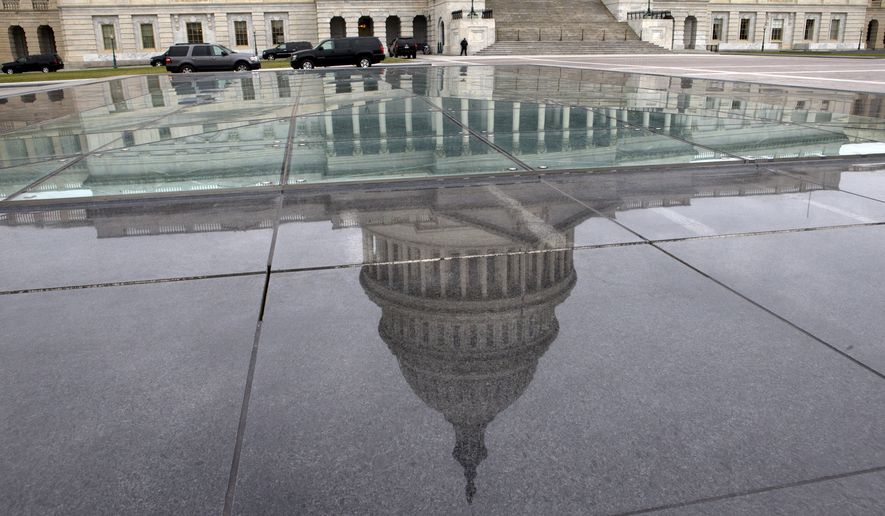The House took the first steps to rein in the visa waiver program Tuesday, rallying to an overwhelming bipartisan vote to demand that high-risk travelers face stricter scrutiny, as Congress and the White House look for ways to keep potentially thousands of foreign fighters from reaching the U.S.
Under the bill, which still needs Senate approval, visitors who normally wouldn’t need a visa but who have recently visited conflict countries such as Syria and Iraq would be forced to face higher levels of scrutiny before being admitted into the U.S.
Homeland Security Secretary Jeh Johnson would be granted power to suspend any of the 38 countries that belong to the visa waiver program if he decides they aren’t sharing critical information with American law enforcement.
Some Middle East rights groups objected, saying they were being singled out for harsher treatment.
Lawmakers brushed aside those concerns, saying the waiver program is a privilege extended when security concerns are low.
President Obama supports the bill, and it has won overwhelming backing in the House, where last month’s Islamic State-orchestrated attacks in Paris and last week’s apparent lone-wolf attack in California have left lawmakers reaching for concrete votes in Washington.
“Terrorist fighters have America in their hateful, evil sights,” Rep. Ted Poe, Texas Republican, said just a few hours before the bill passed on a 407-19 vote, with all of the opposition from Democrats.
Congress has struggled to respond to the sense of vulnerability Americans expressed after the Paris terrorist attacks, perpetrated chiefly by Belgian and French citizens.
Thousands of people with passports from countries that are part of the visa waiver program are believed to have traveled to Syria and Iraq to train with the Islamic State terrorist group, adding to fears that they could exploit the program to gain quick access to the U.S.
Under the visa waiver program, visitors do not have to undergo the in-person interviews that all others face.
Meanwhile, the report that one of the Paris attackers had gained entry to Europe by posing as a Syrian refugee sparked fears that attackers would use Mr. Obama’s pledge to accept and resettle some 10,000 Syrian refugees this fiscal year as a way to gain a foothold in the U.S.
Mr. Obama insisted that the refugee program is secure and that terrorists wouldn’t want to wait the years it takes for vetting. But the House, not content with his assurances, has passed legislation to require that the Homeland Security, FBI and intelligence chiefs certify each Syrian refugee before they are admitted.
Mr. Obama has said that proposal betrays American values and has vowed to veto the bill if it reaches his desk. That prospect is increasingly unlikely because the bill has stalled in the Senate.
Still, as fear of an attack grips the country, lawmakers in Washington are struggling to respond with legislation.
A poll from The Associated Press-GfK found there is widespread antipathy toward immigration from the Middle East, with 54 percent of Americans saying the U.S. accepts too many people from that region.
Sen. Ted Cruz, a Texas Republican seeking his party’s presidential nomination, introduced a bill to give governors the power to reject refugees whom the administration wants to send to their states. A majority of states have expressed resistance to Mr. Obama’s refugee plans, citing security concerns.
Mr. Obama has signaled that he would resist any efforts to constrain his powers. The bill that cleared the House on Tuesday, however, empowers him and gives Homeland Security Department officials extra leeway.
“That’s something that we have indicated our support for,” White House press secretary Josh Earnest told reporters.
He said the White House still wants Congress to take other steps, including passing a bill to prohibit those on the FBI’s terrorist watch list from purchasing firearms.
Democrats have tried repeated procedural moves to force a vote on that proposal but have been blocked by Republicans, who question the value of watch lists. These lists are assembled by law enforcement without judicial involvement, and at one point included even Sen. Edward M. Kennedy.
A bipartisan group of senators has introduced a stiffer visa waiver bill that would require those from visa waiver countries to submit biometric data before they travel.
U.S. Travel, an industry lobby, said it was unclear when the biometric information would be collected and feared it would put a major crimp in visits to the U.S. and cost the economy tens of billions of dollars.
The group is backing the bill that passed the House, deeming it a “thoughtful option.”
The American Iranian Council, though, blasted the bill as discrimination on the basis of ethnicity.
“Today was a bad day for equal rights. If the House of Representatives gets its way, Iranian-Americans and others will be relegated to second-class citizens,” the group said.
In reality, the bill applies only to visitors traveling on foreign passports, not Americans.
Democratic opponents in Congress said they had wanted to see specific exemptions for journalists and aid workers, who may well have visited questionable countries but were unlikely to be security risks.
“Our focus should be on behavior, not just country of origin,” said Rep. Keith Ellison, Minnesota Democrat. “While this bill does not restrict entry into the U.S., it does create additional barriers.”
• Stephen Dinan can be reached at sdinan@washingtontimes.com.




Please read our comment policy before commenting.